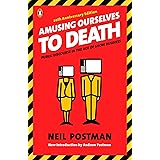
Enjoy fast, free delivery, exclusive deals, and award-winning movies & TV shows with Prime
Try Prime
and start saving today with fast, free delivery
Amazon Prime includes:
Fast, FREE Delivery is available to Prime members. To join, select "Try Amazon Prime and start saving today with Fast, FREE Delivery" below the Add to Cart button.
Amazon Prime members enjoy:- Cardmembers earn 5% Back at Amazon.com with a Prime Credit Card.
- Unlimited Free Two-Day Delivery
- Streaming of thousands of movies and TV shows with limited ads on Prime Video.
- A Kindle book to borrow for free each month - with no due dates
- Listen to over 2 million songs and hundreds of playlists
- Unlimited photo storage with anywhere access
Important: Your credit card will NOT be charged when you start your free trial or if you cancel during the trial period. If you're happy with Amazon Prime, do nothing. At the end of the free trial, your membership will automatically upgrade to a monthly membership.
Buy new:
$22.67$22.67
Ships from: Amazon Sold by: VxSells
Save with Used - Good
$9.98$9.98
Ships from: Amazon Sold by: Dream Books Co.

Download the free Kindle app and start reading Kindle books instantly on your smartphone, tablet, or computer - no Kindle device required.
Read instantly on your browser with Kindle for Web.
Using your mobile phone camera - scan the code below and download the Kindle app.

OK
In the Absence of the Sacred: The Failure of Technology and the Survival of the Indian Nations Paperback – August 11, 1992
Purchase options and add-ons
In this provocative work, Mander challenges the utopian promise of technological society and tracks its devastating impact on native cultures worldwide. The Western world’s loss of a sense of the sacred in the natural world, he says, has led us toward global environmental disaster and social disorderand worse lies ahead. Yet models for restoring our relationship with the Earth exist in the cultures of native peoples, whose values and skills have enabled them to survive centuries of invasion and exploitation.
Far from creating paradise on Earth, technology has instead produced an unsustainable contest for resources. Mander surveys the major technologies shaping the new world order”computers, telecommunications, space exploration, genetic engineering, robotics, and the corporation itselfand warns that they are merging into a global mega-technology, with dire environmental and political results.
- Print length458 pages
- LanguageEnglish
- PublisherSierra Club Books
- Publication dateAugust 11, 1992
- Dimensions6 x 1.25 x 9 inches
- ISBN-100871565099
- ISBN-13978-0871565099
Books with Buzz
Discover the latest buzz-worthy books, from mysteries and romance to humor and nonfiction. Explore more
Frequently bought together

Customers who viewed this item also viewed
Editorial Reviews
From Publishers Weekly
Copyright 1992 Reed Business Information, Inc.
About the Author
Product details
- Publisher : Sierra Club Books (August 11, 1992)
- Language : English
- Paperback : 458 pages
- ISBN-10 : 0871565099
- ISBN-13 : 978-0871565099
- Item Weight : 1.32 pounds
- Dimensions : 6 x 1.25 x 9 inches
- Best Sellers Rank: #756,835 in Books (See Top 100 in Books)
- #2,785 in Cultural Anthropology (Books)
- #8,117 in Economics (Books)
- Customer Reviews:
About the author

Discover more of the author’s books, see similar authors, read author blogs and more
Customer reviews
Customer Reviews, including Product Star Ratings help customers to learn more about the product and decide whether it is the right product for them.
To calculate the overall star rating and percentage breakdown by star, we don’t use a simple average. Instead, our system considers things like how recent a review is and if the reviewer bought the item on Amazon. It also analyzed reviews to verify trustworthiness.
Learn more how customers reviews work on Amazon-
Top reviews
Top reviews from the United States
There was a problem filtering reviews right now. Please try again later.
At 25 years old, "In the Absence of the Sacred" is more relevant than ever. Mander speaks for peace, justice, nature, love, health, the long-term survival of humanity, and a critical deliberation of values, all of which have been silenced in the name of profit and technological progress.
TWO BOOKS IN ONE
Mander was originally writing two separate books--one, a critique of our unquestioned acceptance of technology and progress, and a second on the destruction of native values. Ultimately he realized that these two issues were connected. He saw a clash of values, where one way of life was being systematically destroyed in favor of another. And that maybe the way of life that's winning, through force, isn't the better way. I wish these two critiques were more seamlessly integrated, and that the transition between the two parts of the book was smoother and better rationalized. But while this would have improved the reading experience, the value of the criticism is the same.
DELIBERATION OF TECH
Mander’s call for the careful deliberation of how technology will be applied in society and a thorough examination of its potential consequences, particularly on a holistic level (not just how it will improve the end user's lifestyle), is important. Toffler recommended something similar in "Future Shock." It would be wonderful to deliberate over and regulate emerging tech. Can it be done? Can we ever put the genie back in the bottle? Will humans ever be mature enough to have power but not use it, or to carefully control how we use it? Certainly not in a society of late-stage capitalism where regulation is out the window and profit-driven corporations run the show. Mander’s notion that our inability to critically evaluate technology in the best interests of the people and the planet may be our ultimate downfall is powerful and disquieting.
BLANKET CONDEMNATIONS
Mander condemns certain technologies categorically. I don't think this is fair. Just because they aren't being used responsibly now, like television, doesn't mean they couldn't ever be. For example, Mander wholly rejects space as a noble destination for humanity. I disagree. I think it would be an outstanding achievement for humanity to be born from the earth and to move into the stars and to explore the vast unknown abyss. Mander bundles space with everything that's bad in the technological narrative, and I don't think this has to be the case. I think we could live in a sustainable, just society, and explore space, too.
Earth is our home, but it won't be around forever. There are many natural existential risks all around us—super volcanos, asteroids, climate change (this happens naturally, too), pandemics--I'd like to see humanity grow up and take control of our own destiny. I'd like to see us transcend our total vulnerability to the earth's capriciousness. Just as civilization deserves a hefty helping of criticism, it's important not to swing too far to the other side of the pendulum and idealize nature as a loving mother. Nature doesn't love us and it will wipe us out if we overstay our welcome.
RESTLESS READING ABOUT THE NATIVES
The section on native Americans is tragic, yet it is also one of the most boring parts of the book. It devolves into journalistic reporting of Mander's personal adventures with native peoples and plods on with a slow, dry historical recapitulation of how the natives lost their world. Most of us have heard this story before. We know how awful it was and another long, boring account of the atrocities isn't necessarily helpful.
GLOBALIZATION
Beyond his writing on Native Americans, however, Mander goes into the organized, systematic, global attack on native people, and I found this shocking and riveting. Industrial civilization is a bona fide monster. It doesn't care about the earth or the indigenous populations of the world. It steals and murders and wrecks the land, and it leaves entire nations leveled, violated, poor, and powerless.
Mander gets the reader up to speed on the atrocities of economic globalization. Reading this section, you come to realize that these attacks on native populations are not sporadic. They are a coordinated effort on the part of the western market economy to take by force resources, nature, and the lifeblood of the native people, moving them around like cattle, leaving them to die after laying waste to their societies, or just slaughtering them en masse. It's brutality on a grand scale, mechanized savagery, a side of life you'll never see on corporate TV. The monster of globalization devours everything in its path.
LORD OF THE FLIES
In the light of this monstrous force of globalization, you wonder: is technology the real villain? Or is it something more sinister? An ideology of savagery. A brutal disregard for human life and the living systems of the planet. A ravenous ego that serves only itself. Technology, I suggest, is only instrumental in a positivist, mechanistic, materialist paradigm that desiccates the human spirit. The title of the book is "Absence of the Sacred," yet ironically Mander never gets around to defining the sacred and describing why it's valuable. He never discusses Weber's idea of disenchantment, for example, which one would expect to be featured here.
In sum, this is a provocative book that pulls back the curtain on a great deal of injustice, inhumanity, and thoughtless action in the name of progress. I’m not certain that it always gets directly at the root of the problem, but it makes you doubt the fundamental values of modern society and leaves you with a strong conviction that, whatever the right track may be, we’re not on it.
Mander makes it clear that technology will not only NOT save the world but is in fact destroying the world. The realities of what we have lost as a civilization are incalculable -- most of our land is polluted, 90% of our big fish are extinct, 40% of all living species are gone, water the most precious of all resources is disappearing everywhere. Mander lays bare the bones of the cartesian paradigm (mechanistic thinking) in a world on the fast track to mindless over consumption and disrespect for the very things that make life possible.
I love the comment from his publisher at the beginning of the book "Indians, smindians…" like who gives a damn anymore about Indians. Mander's fulgent analysis sheds light on the power of indigenous knowledge and wisdom and the profound connection to the land -- a connection that cannot be broken but only to our peril.
Mander goes out on a limb here considering the modern world is Like Icarus, hurtling mindlessly toward the sun ...in our desire for everything and the machinery and devices that are making it easier to digest the earth faster and faster…we have no connection to any of this…we are oblivious to our core instincts, that's how far we have drifted from our ability to sense and understand the intangible values of the natural world...while our knowledge of food and other essentials is neither valued or appreciated.
We have lost our sacred connection to the land and god help us if we can, at this late stage get it back.
Thank YOU Mander for a tome that tells it like it is.
The Native people of this land (and the entire planet for that matter) have been saying the *same* things for over 500 years; they will continue to say the same things for the next 500 years. It is up to everyone else to decide if we will, finally and profoundly, listen and try to understand the depth of what they have been and are saying about the ways in which to live right, before our ambitious yet arrogant attempt to create "the last best hope of man" falls utterly. Contrary to our blind faith in machines to solve human problems, the future is not high tech. It will be utterly low tech, it will be "tribal", "native." Something Native people have been saying, again, for over 500 years.
We no longer have the luxury of saying, "we didn't know." Because the words are here. The truths are here. Pass it on!
















